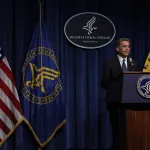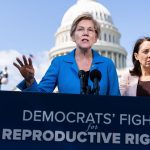Following the Supreme Court’s decision to overturn Roe v. Wade — the case that guaranteed the right to an abortion — President Joe Biden and the Department of Justice have endorsed a legal theory that could weaken states’ efforts to ban access to medication abortion. Soon after the court’s 6-3 decision was released Friday, Attorney General Merrick Garland offered the first clues of how the federal government may attempt to shore up at least some level of abortion protections.
“We stand ready to work with other arms of the federal government that seek to use their lawful authorities to protect and preserve access to reproductive care,” Garland said.
In particular, the president and attorney general both pointed to the power of the federal government to maintain access to mifepristone, a pill used to manage miscarriages that is also part of a two-pill regimen to terminate many first-trimester pregnancies.
“My administration will also protect a woman’s access to medications that are approved by the Food and Drug Administration — the FDA — like contraception, which is essential for preventative health care, and mifepristone, which the FDA approved 20 years ago to safely end early pregnancies and is commonly used to treat miscarriages,” Biden told reporters soon after the decision was issued.
He added that he is directing the Department of Health and Human Services (HHS), which oversees the FDA, to ensure medications such as mifepristone are available “to the fullest extent possible.” In a separate statement, HHS Secretary Xavier Becerra said his adminstration would “use every lever” to protect access to abortion, singling out medication abortion in particular. When asked about mifepristone policy at the Aspen Ideas Festival on Friday, FDA commissioner Robert Califf said he would not contradict statements issued by the president and attorney general.
-
More on medication abortion
- Medication abortion and clinics on federal land: Here are Democrats’ ideas to protect abortion access
- Medication abortion is the nation’s future. What does it feel like?
- Medication abortion is recognized as safe — even without a doctor — but do enough people know about it?
In his statement, Garland pointed to a legal theory known as preemption. The idea is that because the FDA has approved the use of mifepristone, states cannot further restrict access to the drug.
“States may not ban mifepristone based on disagreement with the FDA’s expert judgment about its safety and efficacy,” Garland said in his statement.
So far, 13 states have laws on the books that would ban abortions following the end of Roe. As of this writing, five have taken effect. A preemption argument could also weaken laws banning abortions for people beyond six weeks of pregnancy.
If a court agrees that the FDA’s approval of mifepristone preempts state bans, then it should — at least theoretically — reject state laws banning access to mifepristone for people up to 10 weeks of pregnancy. That would effectively reverse a law banning access to the majority of first-trimester abortions.
“This shows that Garland is really thinking about some of the issues we’ve been screaming about in the media,” said Greer Donley, an assistant professor of law at the University of Pittsburgh Law School. “I’m very excited to see the Biden administration through the attorney general really thinking strongly about this issue.”
Still, it’s not clear if the administration will follow through on this promise or what that would look like. HHS or the DOJ could attempt to challenge state laws that ban using mifepristone for abortions up until 10 weeks of pregnancy, or the government could simply sign on in support to cases filed by other independent organizations making the same argument.
There is little legal history showing whether the preemption argument would hold. In only one circumstance has it really been tried: in Massachusetts, when a federal court struck down a state law banning access to opioids beyond what the FDA had approved.
-
Read Next:
And the outcomes are far from certain. The federal government would have the strongest claim of preemption if it challenged state laws that specifically regulated mifepristone based on claims of safety and efficacy, said Ameet Sarpatwari, assistant director of Harvard Medical School’s Program on Regulation, Therapeutics and Law. That’s because safety and efficacy of drugs fall strictly within the FDA’s purview. If the federal government used this argument to challenge a broader law — such as a blanket ban on abortions — courts might be less willing to carve out an exception to the ban for people using medications up to 10 weeks of pregnancy.
Still, he said, it’s an argument the Biden administration should consider if it is serious about maintaining abortion rights.
“It makes little sense to me how you can have an FDA-approved drug but not have it be able to be used at all within a state. I still think it’s worth trying to pursue that preemption argument,” Sarpatwari said. “At this point, it’s sort of all available tools in the arsenal need to be used if your desire is to promote reproductive rights.”
Any lawsuit leveraging the preemption argument would need to be filed against a state that has banned access to first-trimester abortions and that falls into a federal court circuit that might be sympathetic to the preemption argument, Donley said. That’s easier said than done. Under former President Donald Trump, the federal judiciary shifted far to the right, and conservative justices are largely considered less open to cases that would maintain abortion rights protections.
There certainly are states where this type of challenge could be viable, Donley said. But any relief issued by a federal court would likely be limited, blocking just the individual state’s laws banning access to mifepristone specifically for people terminating pregnancies up to 10 weeks. If a federal court tried to issue a nationwide injunction — using a preemption case to block first-trimester abortion bans across the country — that would likely be appealed quickly to the Supreme Court.
“Ideally this is a theory you could take all the way to the Supreme Court and win, but understandably many have argued that the Supreme Court that just overturned Roe might not be sympathetic to creating this huge exception,” Donley said.








